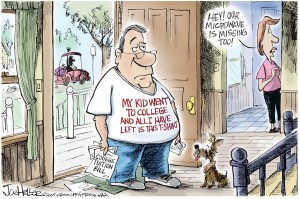April, 2021 archive
How to Ensure That College is a Good Investment 0
 As the high school Class of 2022 becomes the college Class of 2026 as freshmen in college, the College Board continues to support the belief that earning a college degree now is more important than ever before in the global economy. A typical bachelors-degree recipient, they claim, earns 80 percent more than a high school graduate during a 40-year career, more than $500,000 over a lifetime. That financial incentive has resulted in an enrollment surge in the past decade for American colleges and universities.
As the high school Class of 2022 becomes the college Class of 2026 as freshmen in college, the College Board continues to support the belief that earning a college degree now is more important than ever before in the global economy. A typical bachelors-degree recipient, they claim, earns 80 percent more than a high school graduate during a 40-year career, more than $500,000 over a lifetime. That financial incentive has resulted in an enrollment surge in the past decade for American colleges and universities.
In addition, since 1990, supply and demand and increased Federal Aid loan and grant programs (for the poor) have allowed colleges to continue increasing tuition and fees faster than inflation since 1990. (Grove City College is a prime exception.) This has stretched the budgets of parents with incomes ranging from $100,000 to $350,000 to save even enough to cover one or two years of college costs. In past posts I discussed why college is so expensive.
When the financial bubble burst because of lack of oversight of investment banks in 2008, average college costs in the U.S. consumed some 40 percent of median earnings in the United States, up from less than a quarter of income eight years earlier.  Now as students and parents have fallen prey to the student loan scam, debt has surpassed more than $1 trillion, parents are asking what they were getting in return for the high cost of a college degree. While the value of higher education to prepare for a career continues to be the big selling point promoting college, prospective students and their parents are beginning to cast doubt on the return on investment of certain majors and particular colleges.
Now as students and parents have fallen prey to the student loan scam, debt has surpassed more than $1 trillion, parents are asking what they were getting in return for the high cost of a college degree. While the value of higher education to prepare for a career continues to be the big selling point promoting college, prospective students and their parents are beginning to cast doubt on the return on investment of certain majors and particular colleges.
In response, many colleges, like Lafayette, and High Point University are focusing even more on the outcomes of their students and are putting in place programs to better prepare their undergraduates for the job market. In an extensive survey of college leaders, conducted by The Chronicle of Higher Education in the fall of 2014, six in 10 of them reported an increase in discussions about job preparation for their graduates in just the past three years. The survey, completed by some 800 vice presidents, deans and directors at two-year and four year colleges, focused on their attitudes about the value of their degrees, strategies to measure the outcomes of their graduates, and what skills higher education should provide to students.
President Obama used the annual address to announce new higher-education proposals, proposals that did not bring joy to college 
administrators who wanted more federal dollars for student aid. But on this night, the president was not to announce any new federal investment in higher education. Instead, he said his administration would release a new College Scorecard that parents and students can use to compare schools based on a simple criterion: where you can get the most bang for your educational buck.
Now there would be a government tool (and additional layers of costly, redundant bureaucracy) that would turn college into a product to compare in the same way consumers size up cars or televisions in Consumer Reports. The more things that change, the more they stay the same. Everyone wants to protect what they have, particularly if what they have is a cash cow.
Working with students with college aspirations, we show them the value of following steps that will lead to the outcomes they want. One of those steps is helping them discover what they want and another to help them understand the financial ramifications of those decisions.
 While colleges and universities attempt to redefine their approaches to measuring student outcomes after graduation, we show families how to do their own due diligence in measuring the merits of colleges by asking good questions and applying good old, albeit rare, critical thinking.
While colleges and universities attempt to redefine their approaches to measuring student outcomes after graduation, we show families how to do their own due diligence in measuring the merits of colleges by asking good questions and applying good old, albeit rare, critical thinking.
It all starts with a complimentary get acquainted, no obligation conversation with us at (978) 820-1295. Simple postgraduate surveys are not enough for many prospective parents and students to. But there are proven methods to prepare students for the job market and measure their success long after graduation.
